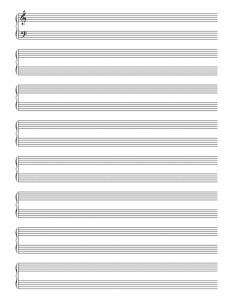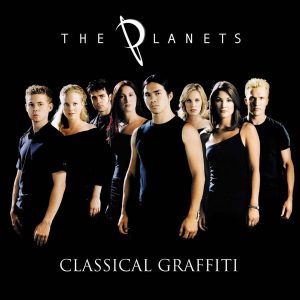Stella Case No. 005, Originally Published: 25 September 2002
British musician Mike Batt produced the album Classical Graffiti for the rock group The Planets. The album had two distinct styles on it, so Batt decided to put a minute’s break between the two sections.

“I thought for my own amusement it would be funny to call it something, so I called it ‘A Minute’s Silence’ and credited it as track 13, and put my name as Batt/Cage, as a tongue-in-cheek dig at the John Cage piece,” Batt said.
The Cage piece he refers to is a 1952 “composition” called “4’33″”, a “famous” bit of “music” — 4 minutes and 33 seconds of silence — by American avant-garde composer John Cage, who died in 1992. Oddly, Cage was granted a copyright for “4’33″” — a copyright for, essentially, nothing. Batt’s acknowledging Cage’s “work,” even in a cheeky way, was a big mistake: Peters Edition, Cage’s music publisher, sued Batt for copyright infringement on behalf of the John Cage Trust, asking for a quarter of the royalties from Batt’s album.
That’s right: the lawsuit claimed Batt stole his silence from Cage.
“As my mother said, ‘Which bit of his four minutes and 33 seconds are they claiming you stole?’,” Batt said at the time. None of it, he insisted. “I certainly wasn’t quoting his silence. I claim my silence is original silence.” Perhaps in the world of lawsuits such a claim makes some sort of logical sense.
When the infringement claim came to light, few thought it could possibly prevail. Duncan Lamont, a British lawyer specializing in the music industry, was one expert who rolled his eyes over the squabble. “Is [Cage’s composition] a work? Has it been written down, is it a literary, artistic or dramatic work? The argument will be there is no work because there are no notes.” If there is “no work,” there could be no infringement and the case would fail.

Batt, too, was feisty. “Has the world gone mad? I’m prepared to do time rather than pay out,” he told the press. “We are talking as much as 100,000 pounds” (US$155,000) in royalties. Besides, he said, “mine is a much better silent piece. I have been able to say in one minute what Cage could only say in four minutes and 33 seconds.”
But just a few months later, Batt was done — he settled out of court for an undisclosed six-figure sum, or pretty much what he was afraid he would have to pay if the suit succeeded. He handed over a check on the steps of the High Court in London, saying he was “making this gesture of a payment to the John Cage Trust in recognition of my own personal respect for John Cage and in recognition of his brave and sometimes outrageous approach to artistic experimentation in music.”
A spokesman for Peters Edition, Cage’s publisher, called the payment a “donation” which was accepted “in good spirit.” He said the company had been ready to go to court to defend the copyright they controlled.
Donation, publicity stunt — or extortion payment? You be the judge, but be warned: now that you know of this case, you really can’t afford to be silent about it.
Sources
- “‘Silent Works’ Do Battle,” BBC News Online, 17 July 2002.
- “Mike Batt Sued over Copyright to Song of Silence,” Ananova, 18 July 2002.
- “British Musician to Pay in Lawsuit,” Associated Press, 24 September 2002.
Case Status
Settled.
My 2020 Thoughts on the Case
This is a very rare (only?) example of a True Stella Awards case that’s (mostly) not based in the United States. But I still think it was a publicity stunt.
Letters
Jill, who is (I think) in Georgia writes: “I am a forensic science major, and as part of my curriculum I am taking an expert testimony class. My instructor brought up some of the bogus Stella Awards in class the other day and it was a great pleasure to tell him about the True Stella Awards!”
- - -
Email Subscriptions
No new cases are being published, so please don’t try to submit cases.
My Flagship Email Publication This is True continues to come out with new stories every week. It’s “Thought-Provoking Entertainment” like Stella, but uses weird-but-true news items as its vehicle for social commentary. It is the oldest entertainment newsletter online — weekly since 1994. Click here for a This is True subscribe form.

I think he might have lost had he fought to the last. It really wasn’t about the silence. The content could have been anything at all, its just utterly amusing that it happened to be silence. By crediting Cage for track 13 he was acknowledging that Cage had a claim to the inspiration of that piece and Batt ended up using that connection to his own benefit. Perhaps publicity over the wacky dispute sold a few albums.
—
I still think Duncan Lamont (the Brit lawyer specializing in music business) had it right, but then I still think I was right at the end of the case: publicity stunt. Either way, I’m sure it helped sell albums! -rc
Assuming the image above is of Cage’s “work” . . . Had Cage been industrious enough to write “music” in the form of denoting a clefs, time signatures, and a key, and then adding rests through several measures of sheet music he would have claim on “work” but his laziness of simply leaving a blank sheet of lined paper should not have entitled him to a copyright in the first place.
I wonder how many times his work got played on the radio? Although, any clever symphony would advertise his work as being “played” during intermission.
—
As the caption indicates it’s an illustration, not an actual copy of either “work”. -rc
This supposed case was busted in 2010 when Mike Batt admitted it was a publicity stunt and there was never any serious litigation. The ‘undisclosed six-figure sum’ was a £1,000.00 donation (six figures including those after the decimal point) he made to the John Cage trust in exchange for the publicity.
Even though this story did bring the world’s attention to real problems with copyright law, I think it no longer deserves the Stella Award it received in 2002 under false pretense.
—
While I agree most Internet users need to know more about copyright law, since they can get into seriously expensive trouble in their ignorance, this absolutely deserves a Stella: it was announced that Batt had been sued. Maybe a lie, but one with a chilling effect. I suggested from the start it was a publicity stunt, and suspected it was “six figures including the cents” silliness, but had nothing to prove it at the time. Sadly, all that didn’t come out until many years later. The Dishonorable Mention stands, and there will be more like it — it’s why there’s a “Publicity Stunt” category! -rc
In this case, silence really WAS golden.
—
Now that’s funny! -rc
Funny (to me) thing is, if it had been an actual case, Batt’s lawyer most likely would have gotten costs down to one-half of one-seventeenth of the actual songwriter royalties. That is, a typical co-writer royalty for 1 track on a 17-track album. Much less than 25% of the total album. Might have been close to the actual check he handed over. 😉
dd if=/dev/zero bs=4 count=$( ((4*60) + 33 ) * 44100 ) | sox -t raw -r 44100 -c 2 -f s "John Cage - 4'33.wav"
That’s a command that “reproduces” this work that can be run on MacOS, Linux, BSD, Windows Subsystem for Linux, Windows Subsystem for Unix, Cygwin, among other platforms. The only dependency would be `sox` which takes the (still infringing) raw audio input and converts it to Microsoft WAV format. The other command would probably work on Bell Labs’ Unix.
If the John Cage Trust really think that can be “copyrighted”, lets see them sue the likes of Apple, AT&T, Canonical, Oracle, Microsoft…
For that matter, I think I have some audio cassettes that came out of the factory with infringing copies of this “work”.